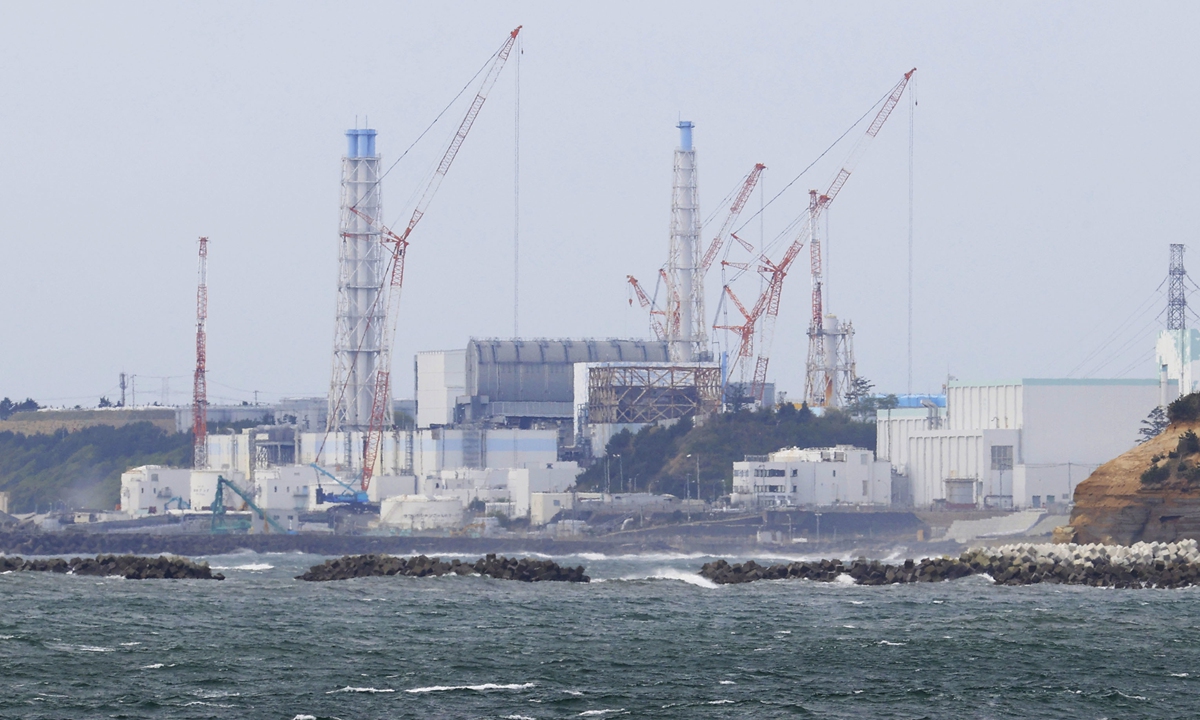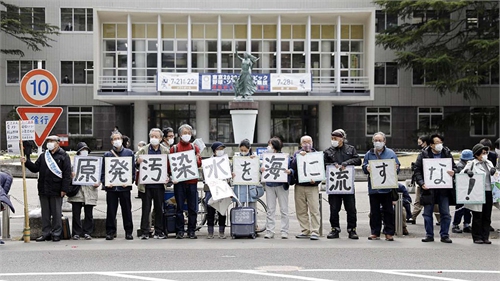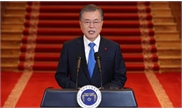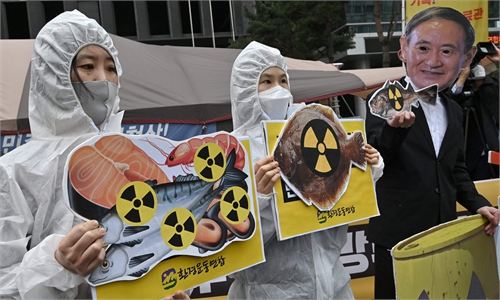As opposition grows, Japan’s wastewater plan could have fatal impact on its exports
Decision to have fatal impact on Japanese exports

Photo taken from Namie in Fukushima Prefecture, northeastern Japan, on Tuesday shows the crippled Fukushima Daiichi nuclear power plant. Tokyo decided the same day to release radioactive water into the sea. Photo: VCG
Japan's decision to dump radioactive wastewater into the ocean will draw more fierce opposition from neighboring countries and regions in the near future, which could cause fatal impact on some Japanese exports that are already struggling to overcome reputational damage after the nuclear crisis a decade ago.
The Japanese government's decision to dump contaminated water from its crippled Fukushima nuclear plant into the sea in two years has also drawn fierce opposition by local fishermen and residents as well as the international community.
China and South Korea urged Japan to prudently handle the issue based on full consultation with international organizations and its neighbors, and the substantive participation of relevant countries and international organizations, the Xinhua News Agency reported.
The call was made at the first meeting of China-South Korea dialogue and cooperation mechanism of maritime affairs via video link.
South Korean President Moon Jae-in ordered officials on Wednesday to explore petitioning an international court over the Japanese government's decision, Reuters reported on Wednesday.
The South Korean Foreign Ministry on Tuesday summoned Koichi Aiboshi, Tokyo's new ambassador in Seoul, and convened an intra-agency emergency meeting to craft a response.
Beyond the diplomatic efforts, retailers in South Korea have already taken action. Local supermarket chains E-mart, Lotte Mart and Homeplus have confirmed that they will continue boycotting the sale of Japanese seafood, the Korea Times reported Wednesday.
Meanwhile, South Korea's Ministry of Oceans and Fisheries announced on Monday that it would increase seafood management measures for Japanese products.
Russia will also lodge representations with Japan over the decision and call on Japan to inform the concerned countries of the situation, including future measures to minimize harm to the region and the ecology, Russian Foreign Ministry spokesperson Maria Zakharova said on Wednesday.
In China, consumers' confidence in Japanese products has plunged. Seafood sourced from not only Japan, but also around the Pacific Ocean, including Canada and some of China's coastal areas, are among the top concerns.
An employee of Chinese fresh-food chain brand Hema Fresh confirmed to the Global Times on Wednesday that there have been more questions in recent days about the potential effects from Japan's radioactive water on the company's seafood products.
So far, the chain has not made any adjustment to its purchasing plans, including products from the Yellow Sea.
Zhao Lijian, a spokesperson for China's Foreign Ministry, stressed on Wednesday that the ocean is not Japan's "trash can," and the Pacific is not Japan's "sewer," adding that the world should not be forced to pay for Japan's treatment of nuclear wastewater.
In the aftermath of the accident at Tokyo Electric's Fukushima Daiichi nuclear power plant in 2011, many countries and regions implemented restrictions on imports from Japan.
The US Food and Drug Administration (FDA) imposed import restriction on Japanese food that year by making reference to the list of food products that were restricted from export by the Japanese government. The US has openly supported Japan's wastewater plan.
"Japan has been in talks with China about allowing its agricultural products from 10 prefectures around the Fukushima Prefecture to enter the Chinese market over the years since the disaster, but there has been no conclusion," Chen Yan, executive director of the Japanese Corporations Research Institute, told the Global Times on Wednesday.
"The Japanese government's recent decision to dump the nuclear wastewater will only make the negotiations tremendously difficult," Chen said.
Chen said more countries and regions will raise concerns and strong opposition in the near future toward the Japanese government, whose decision will have a fatal impact on its agricultural and fishery products and even industrial ones, as well as its local employment - especially fisherman and farmers, who have already suffered a lot in recent years.
According to a survey conducted by Japan's Department of Fisheries of the Ministry of Agriculture, Forestry and Fisheries earlier this year, only 49 percent of aquatic-product processing enterprises in Fukushima and its surrounding five prefectures saw their sales recover by more than 80 percent.
"Although agricultural industry takes up only 2-3 percent of Japan's economic output, which is mainly driven by the services industry, it relates to a large amount of employment for farmers and fishermen. If their incomes are affected, it is not only an economic issue but one that involves social governance and the national image," Chen noted.
A report on world fisheries and aquaculture in 2020 showed that apart from China, which accounts for 14 percent of global fishery output, countries including Vietnam, Chile, Thailand, the US, and Canada may all be affected by Japan's nuclear sewage.



